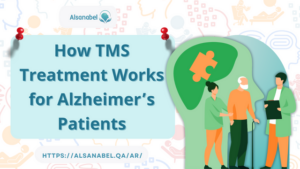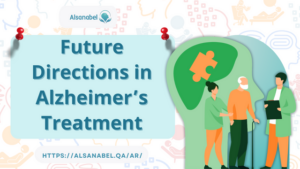Benefits of TMS Treatment for Alzheimer’s Patients 2024
- Category Alzheimer’s Treatment
Alzheimer’s disease affects millions globally, leading to memory loss and cognitive decline. Transcranial Magnetic Stimulation (TMS), initially used for depression, is now being explored as a non-invasive treatment for Alzheimer’s. TMS Treatment uses magnetic fields to stimulate brain cells, potentially improving neural connectivity and function. This article examines the benefits of TMS for Alzheimer’s patients, including the underlying science, clinical evidence, and its potential to enhance patient care and quality of life.
How TMS Treatment Works for Alzheimer’s Patients
Transcranial Magnetic Stimulation (TMS) is a non-invasive treatment that uses magnetic fields to stimulate specific areas of the brain. For Alzheimer’s patients, TMS therapy aims to improve cognitive functions such as memory and attention by modulating brain activity.

Key Points:
- Procedure: Involves placing an electromagnetic coil on the scalp to send magnetic pulses to targeted brain areas.
- Benefits: Can lead to cognitive improvements, is non-invasive, and can be used alongside other treatments.
- Treatment Sessions: Typically conducted several times a week over a few weeks, each lasting 30-60 minutes.
- Safety: Generally well-tolerated with mild side effects like scalp discomfort or headaches; serious side effects are rare.
Ongoing studies are exploring the efficacy and mechanisms of TMS therapy for Alzheimer’s, with early results showing promise but requiring more extensive clinical trials to confirm long-term benefits.
Benefits of TMS for Alzheimer’s Patients
Certainly! Here are the key benefits of Transcranial Magnetic Stimulation (TMS) for Alzheimer’s patients:
- Non-Invasive Treatment: TMS is a non-invasive procedure that doesn’t require surgery or anesthesia, making it a safer alternative to more invasive treatments.
- Cognitive Improvement: TMS has shown potential in enhancing cognitive functions such as memory, attention, and problem-solving skills, which are often impaired in Alzheimer’s patients.
- Minimal Side Effects: Compared to traditional drug therapies, TMS has fewer and generally milder side effects, which may include mild headaches or scalp discomfort.
- Improved Neural Connectivity: TMS stimulates neural activity and enhances brain connectivity, which can help counteract the neural degradation seen in Alzheimer’s disease.
- Enhanced Quality of Life: By potentially improving cognitive functions and reducing symptoms, TMS can enhance the overall quality of life for Alzheimer’s patients and their caregivers.
- Adjunctive Therapy: TMS can be used in conjunction with other treatments, such as medication and cognitive therapy, to provide a more comprehensive approach to managing Alzheimer’s disease.
- Potential to Slow Disease Progression: Early research suggests that TMS might help slow the progression of Alzheimer’s, offering hope for maintaining cognitive abilities for a longer period.
- Personalized Treatment: TMS protocols can be tailored to the individual needs of each patient, allowing for personalized and targeted treatment plans.
These benefits highlight the potential of TMS technology as a valuable tool in the fight against Alzheimer’s disease, offering hope for improved management and better patient outcomes.
Integrating TMS into Alzheimer’s Care Plans
Integrating Transcranial Magnetic Stimulation (TMS) into Alzheimer’s care plans involves several key steps:
Key Steps:
- Comprehensive Assessment: Evaluate patient suitability with medical history, cognitive testing, and specialist consultations.
- Customized Treatment Plan: Tailor TMS protocols to target specific brain areas and develop a treatment schedule (e.g., multiple sessions per week for 4-6 weeks).
- Combination Therapy: Use TMS alongside existing treatments like medications and cognitive therapies.
- Monitoring and Evaluation: Regularly monitor patient response and adjust treatment as needed, with frequent cognitive assessments.
- Patient and Caregiver Education: Educate about TMS, manage expectations, and encourage participation in support groups.
- Safety and Side Effects: Implement safety protocols, screen for contraindications, and manage any side effects.
- Collaboration and Communication: Ensure ongoing communication among healthcare providers and obtain feedback from patients and caregivers.
- Research and Adaptation: Stay updated with the latest research and adapt treatment plans based on new findings and patient needs.
By following these steps, TMS technology can be effectively integrated into Alzheimer’s care plans to potentially improve cognitive function and enhance the quality of life for patients.
TMS Treatment Protocols and Sessions
TMS therapy for Alzheimer’s involves using magnetic fields to stimulate brain regions affected by the disease. Here’s a summary of the treatment process:
- Initial Assessment: Comprehensive evaluation including medical history, cognitive tests, and possibly brain imaging to tailor the treatment.
- Treatment Planning: A personalized plan targets specific brain areas, typically the dorsolateral prefrontal cortex (DLPFC), with defined session frequency and intensity.
- Session Structure:
- Duration: Each session lasts 20-40 minutes.
- Frequency: Usually five times a week for 4-6 weeks.
- Procedure: The patient sits comfortably while a magnetic coil stimulates the brain.
- Monitoring and Adjustments: Regular assessments to monitor effectiveness and side effects, adjusting the treatment as necessary.
- Maintenance Sessions: Periodic sessions post-treatment to maintain cognitive benefits, scheduled based on individual needs.
- Follow-Up Care: Regular follow-ups to evaluate long-term effects and adjust ongoing treatments.
- Safety Considerations: Common side effects are mild, such as headaches or scalp discomfort. TMS may not be suitable for individuals with certain medical conditions or implants.
This structured of TMS technology approach aims to enhance cognitive functions and slow disease progression, improving the quality of life for Alzheimer’s patients.
Future Directions in Alzheimer’s Treatment
Future directions in Alzheimer’s treatment focus on various advanced and promising approaches:

- Biomarker Development: Early detection and progress monitoring through new biomarkers.
- Genetic and Molecular Therapies: Utilizing gene editing (e.g., CRISPR) and RNA-based therapies to address genetic mutations and harmful proteins.
- Immunotherapy: Developing vaccines and antibody therapies to target amyloid-beta and tau proteins.
- Neuroinflammation Modulation: Creating drugs to reduce neuroinflammation and modulate the immune response.
- Regenerative Medicine: Using stem cells and treatments that enhance neurogenesis to repair brain damage.
- Precision Medicine: Personalized treatment plans based on genetic and clinical profiles, supported by AI and data analysis.
- Lifestyle and Environmental Interventions: Investigating the impact of diet, exercise, and stress-reducing environments.
- Advanced Imaging and Diagnostics: Employing high-resolution imaging and non-invasive diagnostics for detailed brain observation.
- Combination Therapies: Multi-target approaches combining drugs and non-pharmacological treatments like cognitive training and TMS.
- Global Collaboration and Data Sharing: Encouraging worldwide research collaboration and establishing extensive clinical trial networks.
These directions aim to improve treatment efficacy, enhance patient quality of life, and ultimately find a cure for Alzheimer’s disease.
Integrating TMS into Alzheimer’s treatment plans could revolutionize how we approach the disease, offering an additional tool for healthcare providers and caregivers. As advancements in TMS technology continue and more studies validate its benefits, we move closer to a future where Alzheimer’s patients have access to innovative and effective treatments. The journey towards combating Alzheimer’s is ongoing, but with therapies like TMS, there is renewed hope for better outcomes and improved lives for patients and their families.









